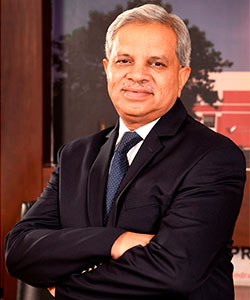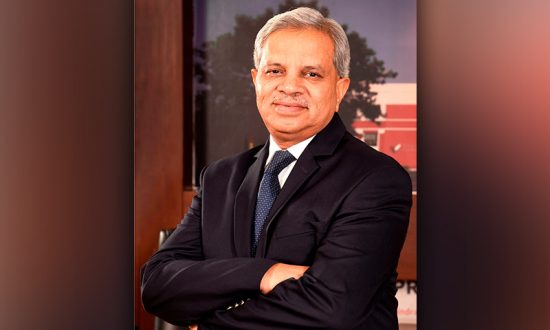Dr Yajulu Medury is an acclaimed academician and a seasoned professional with more than three decades of Academic and Administrative experience. His contributions to the field of academics have been widely acknowledged. He has more than 40 publications to his credit which have been extensively circulated in national and international journals and conferences. In an interaction with Higher Education Digest, Dr Yajulu Medury discusses critical aspects of NEP 2020, the possible changes NEP would bring in the functioning of higher education institutions, his plans for the Mahindra University, and much more.
The New Education Policy 2020 has been a topic of discussion since its announcement. As an educator, what are your key takeaways?
New Education Policy focuses on equitable and inclusive education and rationalizes institutional architecture. We hope the policy is implemented at the earliest, and transparency becomes the norm in education, helping both the educator and the students.
Systemic reforms, which include smoothening of regulatory issues, scrapping of multiple affiliating agencies as well as greater autonomy to educational institutions, will ensure that the focus shifts from administrative work to education. These will lead to the development of quality institutes of eminence, which will be able to decide on the curriculum and ensure topicality.
Focus on research, transparency in the working of organizations and learning outcomes-based education model, have been some of the key demands of the sector, and I am happy that the NEP addresses these.
With the effective implementation and quick roll-out, the sector has the right ingredients to gain global recognition, and attract the best students, faculty and research projects at an international level shortly.
In your opinion, what are the critical aspects of NEP 2020 will augment student-centric reforms?
NEP focuses on a multi-disciplinary approach and focuses on preparing students for jobs for not just today, but also tomorrow. The focus on specializations across disciplines is new to India but been in practice globally for a long time now.
NEP 2020 talks about the importance of applied learning and offering multiple pathways to learning as well as resource sharing. Again, it focuses on technology-enabled pedagogy and flexible subject-combinations. The student will thus be prepared for the future.
We at MU have already been committed to this philosophy, and all our offerings are not just multi-disciplinary and research-focused but also places equal importance on soft skills, communication, managerial skills and innovation.
The NEP 2020 puts the spotlight on multi-disciplinary education. How is Mahindra University uniquely poised to take that vision forward?
Mahindra University has been propounding the concept of multi-disciplinary education for creating well-rounded professionals and individuals who meaningfully contribute to nation-building. We’re happy to note that the Government of India has also focused on this aspect of education in the NEP. We want Mahindra University students to be well informed in their respective fields as well as be good communicators, managers and leaders.
From our inception 6 years ago, we have strived to make a qualitative difference in the way technical education was delivered to students in India. We have been leading from the front through our journey in education: Our unique pedagogy ensured that Mahindra Ecole Centrale became one of the best and most sought after engineering education options for the students. Our tie-up with Ecole Centrale Group of France focused on ensuring that our students became global practitioners in Engineering. We introduced Flip Education, way ahead of others, wherein the emphasis was to engage the students through discussions and collaborative thinking and move them away from bookish knowledge and rote methodology.
We aim to provide an education that imparts skills, encourages thinking and helps build character so that each student can positively contribute to society and to the world. Mahindra University will endeavour to achieve this through critical thinking, focus on innovation and broadening our students’ horizons.
In the backdrop of the NEP 2020, what are the plans for the Mahindra University? How do you intend to be different and make a mark in the education sector?
Our vision for Mahindra University is to ‘Educate Future Citizens for and of a Better World’. We will endeavour to energize, challenge and shape young minds so that they become ‘Global Thinkers & Engaged Leaders’.
École Centrale School of Engineering has commenced operations this year and will be followed by School of Management, School of Law, School of Design, School of Media & Liberal Arts, and the Indira Mahindra School of Education, over the next 2 years.
An educational organization is only as good as its educationists. To help us grow, we have enlisted the help of a talented faculty Pool, all of who have PhD from IITs/IISc and leading overseas institutes in the ratio 60:40. Besides, we have internationally acclaimed visiting faculty. We have already established partnerships with top Indian and global research entities, corporate and academic leaders.
Our focus will be on subject matter research and providing globally relevant education.
How has the NEP-2020 balanced the technological shift in the education sector? What are the efforts of Mahindra University in this regard?
NEP focuses on embracing technology in professional education, and this is a welcome step. NEP also highlights the importance of technology in addressing various societal challenges and seeks to promote interdisciplinary research and innovation. To this end, the NEP invites Higher Education Institutions to set up start-up incubation and tech development centres. The policy also envisions the setting up of the National Research Foundation to create a culture of research.
The policy has also opened the way for the introduction of artificial intelligence and machine learning in education and focuses on the increased usage of online learning to facilitate both learning and teaching.
In this backdrop, Mahindra University is uniquely poised. Our multi-disciplinary, tech-focused, research-oriented, global education delivery will ensure that our students become global professionals in the true sense of the word. We have a holistic approach to education and will use technology to revolutionize the way millennials are studying by combining AI and EI to optimize learning in each of our Schools.
One of our founding principles is a strong focus on quality research in interdisciplinary fields. We will promote research at an institutional level so that we can focus on actual problem solving and contribute to the rise of a New India. Our unwavering commitment to quality research has made us allocate sizable resources to the activity as well as create well-equipped research infrastructure and modern laboratories.
NEP focuses on tech, and at Mahindra University, we have already setup23 well-equipped labs to enable the students to get the first-hand experience in various technologies relevant to their segment of expertise. Some of the labs include a Super Computer Lab, VLSI Lab, Automotive Systems and Internal Combustion Engines Laboratory, Centre for Robotics, Environmental Engineering Lab, and more.
We have already set up 3 centres of excellence: Centre for Artificial Intelligence, Centre for Innovation &Entrepreneurship and Centre for Sustainable Infrastructure and Systems. 3 more centres of excellence will be set up this year, and these include the Centre for Computational and Experimental Mechanics, Centre for Research in Optics and Photonics and Centre for Executive Education
According to you, what are the possible changes NEP would bring in the functioning of higher education institutions?
The Government of India has introduced the concept of “Academic Bank of Credit” to facilitate the digital storage of academic credits earned. This is a progressive idea, but the devil is in the implementation. We look forward to the clarity from the Government on this and specific guidelines on its workability.
NEP has also recommended doing away with multiple regulatory bodies that used to be the norm and provide more autonomy to Higher Educational Institutions. This is a welcome step, and we look forward to focusing on academics more and more, rather than get stuck in the administrative quagmire. Another important aspect is self-governance and usage of technology to better transparency in dealings with the regulatory bodies such as the Higher Education Commission of India and its constituents.
What are your primary concerns going forward?
NEP 2020 is a progressive policy, and we believe that if implemented properly and in a timely fashion, it has the wherewithal to really open up the Indian education sector. The only issue will be timely acceptance, quick implementations and ironing out any cranks in a well-defined timeframe. The ability of the policy to effectively be integrated within the existing setups will be a challenge and is something that needs to be looked at closely.
The Government needs to engage with all stakeholders to ensure that this policy makes a real difference.
About Dr Yajulu Medury

Before joining Mahindra University, Dr Medury was the Vice-Chancellor of Bennett University at Greater Noida, UP While in Bennett University, Dr Medury developed academic partnerships with Georgia Tech for Engineering, Johnson Business Cornell University for Management, Cornell Law School for Law, Babson College USA for Entrepreneurship and others.
In addition, between 2001 and 2003, Dr Medury successfully established 3 Universities (2 State and 1 Deemed). Before that, Dr Medury was the Vice-Chancellor of Jaypee University of IT, Himachal Pradesh and Founding Vice-Chancellor of VIT University, Vellore. Immediately before that, he was the Chairman & Managing Director of Educational Consultants of India Limited, a Public Sector Undertaking of the Government of India. He has proficiently held many senior positions in varied Companies/Institutes besides being Member of several Academic Committees/Governing Councils throughout his distinguished career.
Dr Medury has a B.Tech Honours degree from IIT, Kharagpur and did his MS as well as PhD in Engineering Mechanics from the University of Wisconsin, Madison, USA.




